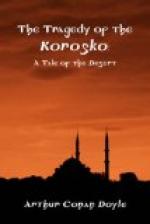“Did he say how long we stopped here?”
“Very little rest, he said, and then forward! Oh, Mr. Belmont—”
“Hold your tongue!” snapped the Irishman, and began once more to count times and distances. If it all worked out as he expected, if his wife had insisted upon the indolent reis giving an instant alarm at Halfa, then the pursuers should be already upon their track. The Camel Corps or the Egyptian Horse would travel by moonlight better and faster than in the day-time. He knew that it was the custom at Halfa to keep at least a squadron of them all ready to start at any instant. He had dined at the mess, and the officers had told him how quickly they could take the field. They had shown him the water-tanks and the food beside each of the beasts, and he had admired the completeness of the arrangements, with little thought as to what it might mean to him in the future. It would be at least an hour before they would all get started again from their present halting-place. That would be a clear hour gained. Perhaps by next morning—
And then, suddenly, his thoughts were terribly interrupted. The Colonel, raving like a madman, appeared upon the crest of the nearest slope, with an Arab hanging on to each of his wrists. His face was purple with rage and excitement, and he tugged and bent and writhed in his furious efforts to get free. “You cursed murderers!” he shrieked, and then, seeing the others in front of him, “Belmont,” he cried, “they’ve killed Cecil Brown.”
What had happened was this. In his conflict with his own ill-humour, Cochrane had strolled over this nearest crest, and had found a group of camels in the hollow beyond, with a little knot of angry, loud-voiced men beside them. Brown was the centre of the group, pale, heavy-eyed, with his upturned, spiky moustache and listless manner. They had searched his pockets before, but now they were determined to tear off all his clothes in the hope of finding something which he had secreted. A hideous negro with silver bangles in his ears, grinned and jabbered in the young diplomatist’s impassive face. There seemed to the Colonel to be something heroic and almost inhuman in that white calm, and those abstracted eyes. His coat was already open, and the Negro’s great black paw flew up to his neck and tore his shirt down to the waist. And at the sound of that r-r-rip, and at the abhorrent touch of those coarse fingers, this man about town, this finished product of the nineteenth century, dropped his life-traditions and became a savage facing a savage. His face flushed, his lips curled back, he chattered his teeth like an ape, and his eyes—those indolent eyes which had always twinkled so placidly—were gorged and frantic. He threw himself upon the negro, and struck him again and again, feebly but viciously, in his broad, black face. He hit like a girl, round arm, with an open palm. The man winced away for an instant, appalled by this sudden




